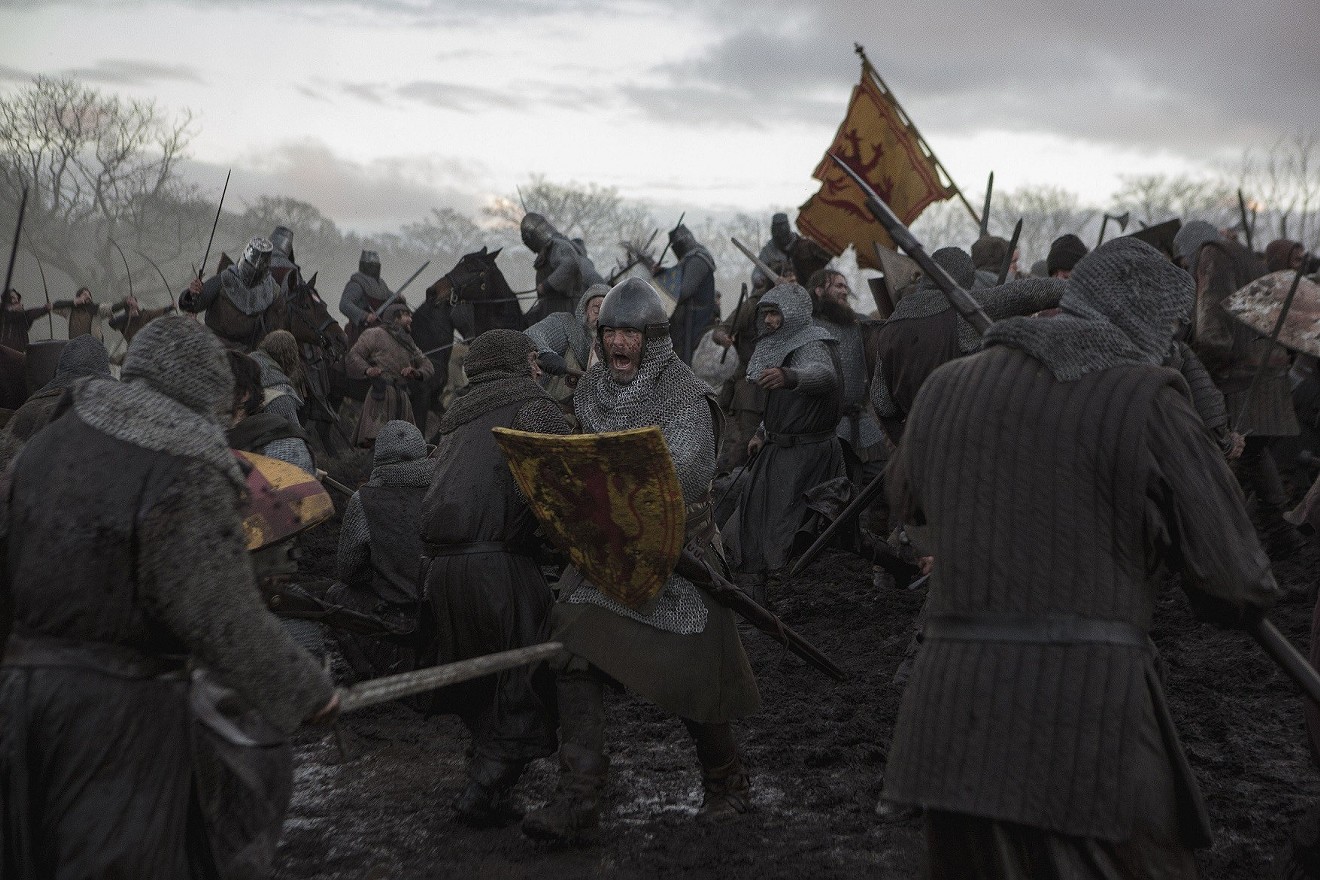Outlaw King premieres on Netflix on Nov. 9
Look, if you’re ride-or-die for sword-and-king entertainment, you owe it to yourself to check at least the first 15 or so minutes of David Mackenzie’s dreary, draining Outlaw King. For just a little while, before it bottoms out with scenes of indistinguishable men milling about Highland mud pits, hacking and “Arrggghhh”ing at each other, Mackenzie’s film pulses with promise, bringing to its 14th century setting some of the swaggering vitality of Mackenzie’s Hell or High Water.
It opens in the regal tent of England’s King Edward, who dresses down the lairds of Scotland he has recently defeated. (Braveheart is something like Outlaw King’s unofficial prequel.) One lord scowls with even more surliness than the rest: Chris Pine is Robert the Bruce, a Scot who will, eventually, declare himself king of his country and wage guerrilla war against Edward. But that’s later. For now, relish how the camera stalks and circles the men, tracking their humiliation but also emphasizing the intimate smallness of their world. Even with all those armed guards around, anyone’s whiskers could tangle up against anyone else’s.
Then, in one long unbroken shot, the camera follows Robert the Bruce out into the gray British day, where he’s immediately challenged to a duel by Edward’s snarling pageboyed princeling (Billy Howle). The fight is to be non-lethal, but the swordplay is spirited, edging toward vicious, each swing and thrust coming in more heated than is allowed by the rules of engagement. Still, Pine makes a swashbuckler’s dance of it. And then, before we get a cut — either in the duel or this bravura opening shot — Mackenzie’s camera passes back into the tent and out the other side, where we behold a catapult, a castle on a hill and then a flaming barrage.
The mood is playful, even exhilarating, historical drama rendered with electric pulp vigor. Also enticing: scenes of Robert’s uncertain betrothal to the whip-smart young Elizabeth (a mostly wasted Florence Pugh), a few glimpses of plainchant religious ceremonies and the Highland vistas and lochs. But soon that elan lets up and the movie gets down to the dully serious business of Scot and Englishman gutting each other. It becomes a slog, lacking character or context, just beardo vs. beardo in the island’s bog pits.
“I am so sick of Scotland,” declares King Edward in one of the film’s scant amusing moments, and by the end even dedicated readers of John Prebble might share the sentiment — or at least with this reduction of Scottishness to mud and murder. Treading its weary path of blood, Outlaw King takes no time to demonstrate to viewers why any of its impalings, eviscerations, assassinations or horse stabbings matter. Our heroes, led by Robert, now the self-proclaimed King of the Scots, prove every bit as vicious as the English lords who tax them, with the filmmakers never bothering to justify or even reckon with this truth. (Or maybe they attempted to, and it got cut; the version of the film that played the Toronto Film Festival ran 16 more minutes.) One favorite tactic of the Scot outlaws is to slaughter enemies by surprise, in church, in the manner of today’s domestic right-wing terrorists. Robert himself murders on hallowed ground, a decisive early act that jolts the film but with a morality that languishes unexamined. I wouldn’t expect Hamlet-style agonizing over that transgression, but Outlaw King doesn’t bother revealing whether Robert believes in God, fears for his soul or has ever once suffered a moment of doubt.
Likewise, it might be refreshing that the filmmakers resist dressing up the historic conflict in elemental speeches about freedom or honor. One fine moment comes late, when Robert finds himself in the position of speech-maker, and he offers up what’s essentially a shrug: He tells the men that he doesn’t care why they fight so long as they do. But Outlaw King itself shrugs, too, never making the war seem urgent or inevitable, and only feinting at richer feeling. All we’re given to care about is the truncated love story between Robert and Elizabeth. The actors have a peppery chemistry but much too little shared screen time. (Pugh does what she can with a role that demands she make wifely obeisance in an arranged marriage look like the actualized decision of a fiery feminist.)
The filmmakers have cut all of Braveheart’s speech-making and “Freedom”-shouting but they rely on our memory of it. It’s the sight of a chunk of the rebel William Wallace’s drawn-and-quartered corpse that inspires Robert to take up arms in the first place. Mel Gibson’s film isn’t just this movie’s unofficial prequel: It’s the larger animal upon which this one is a parasite.
[
{
"name": "Air - MediumRectangle - Inline Content - Mobile Display Size",
"component": "18855504",
"insertPoint": "2",
"requiredCountToDisplay": "2"
},{
"name": "Editor Picks",
"component": "17105533",
"insertPoint": "4",
"requiredCountToDisplay": "1"
},{
"name": "Inline Links",
"component": "18349797",
"insertPoint": "8th",
"startingPoint": 8,
"requiredCountToDisplay": "7",
"maxInsertions": 25
},{
"name": "Air - MediumRectangle - Combo - Inline Content",
"component": "17105532",
"insertPoint": "8th",
"startingPoint": 8,
"requiredCountToDisplay": "7",
"maxInsertions": 25
},{
"name": "Inline Links",
"component": "18349797",
"insertPoint": "8th",
"startingPoint": 12,
"requiredCountToDisplay": "11",
"maxInsertions": 25
},{
"name": "Air - Leaderboard Tower - Combo - Inline Content",
"component": "17105535",
"insertPoint": "8th",
"startingPoint": 12,
"requiredCountToDisplay": "11",
"maxInsertions": 25
}
]












